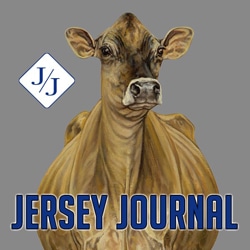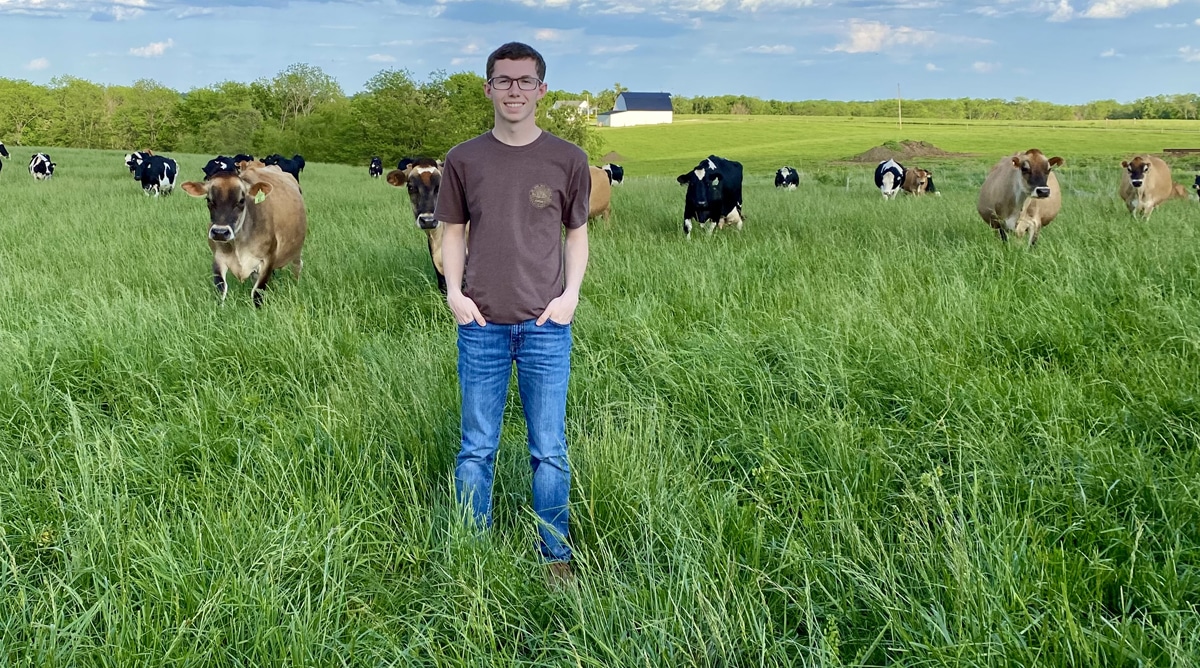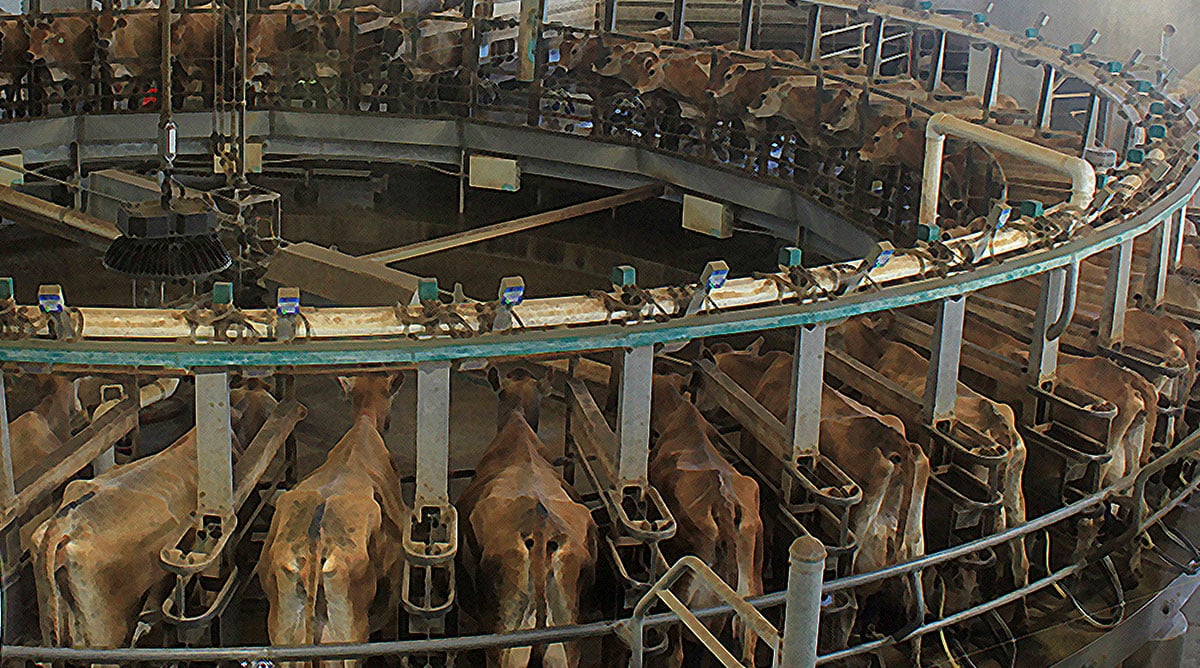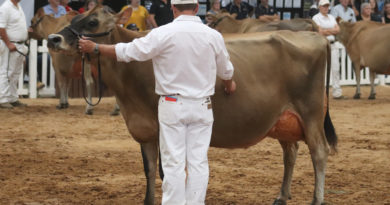Missouri Junior Wins FFA Award with Jersey Project
Missouri junior Cade Claycomb has shown that with a clear destination, a road map, and a little help from friends, it is possible to achieve goals and earn some accolades along the way. The college junior from Spickard developed a herd of Registered Jerseys for his supervised agricultural experiences (SAE) project in FFA and was recently named the national winner of the organization’s dairy production entrepreneurship proficiency award.
For his SAE, Cade focused on growing the purebred genes in the family’s herd of crossbred dairy cattle. He accomplished this by purchasing nine Registered Jerseys from one of the Post Time sales hosted by Ron and Christy Ratliff, in vitro fertilizing five of them, and implanting embryos in the crossbreds.
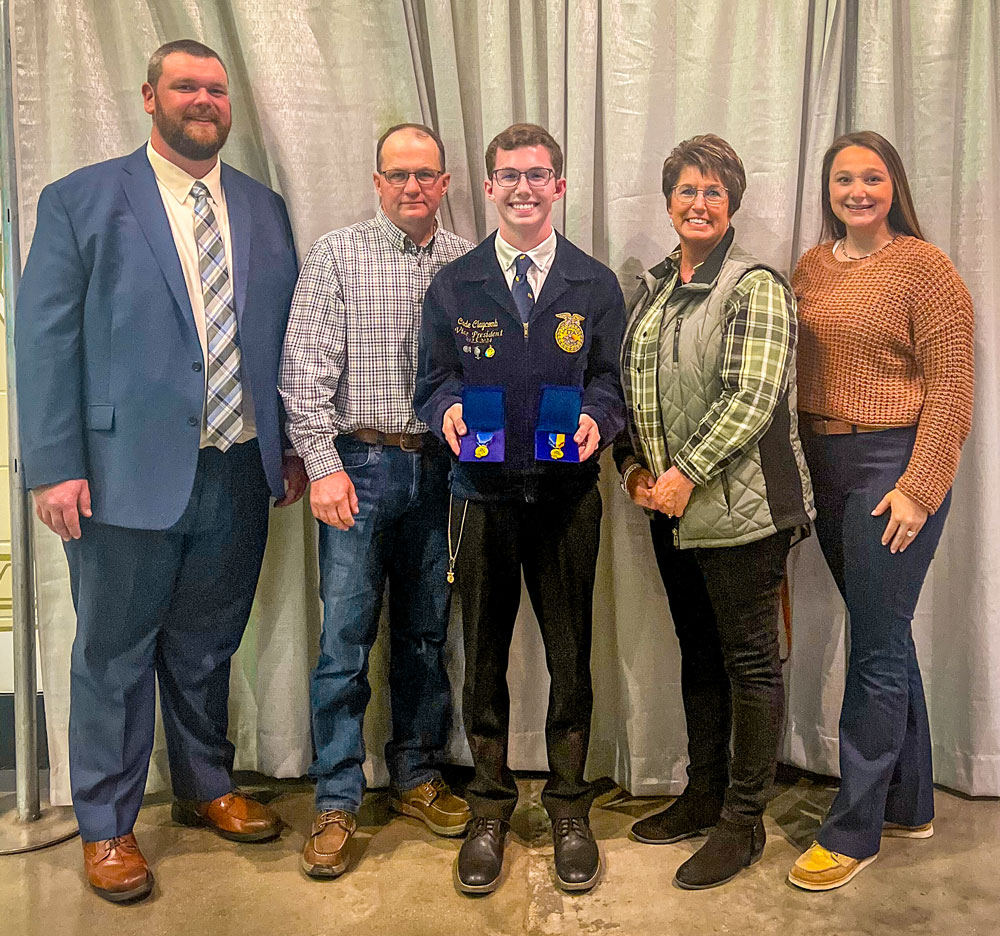
Today, his Registered Jersey herd of 32 cows and 10 heifers is managed on the family farm with the crossbred dairy cows and a small herd of black Angus beef cattle. Cattle are rotational and strip-grazed on sorghum-sudangrass and mixed grass pastures and fed baled alfalfa hay. Milk is sold to Dairy Farmers of America and processed at Hiland Dairy Foods in Kansas City, Mo.
The FFA Project
Farming is a tradition in Cade’s family, one that dates to 1864, seven generations before Cade. Milking cows is a far newer enterprise and milking Registered Jerseys is even newer. Cade’s parents, Clint and Shari, established the dairy farm in north-central Missouri in 2008 with the purchase of several crossbred springing heifers. By 2020, the Claycombs were seasonal milkers, freshening most of the cows in the fall and drying them off in early summer.
“I wanted something a little different for my FFA project, something I could show,” noted Cade. “I was looking for a smaller-framed animal that was less aggressive and easier to work with and one that was profitable from a production standpoint but could be shown as well.”
Cade chose Jerseys. So, in June 2020, the summer before his freshman year at Trenton High School, he traveled to Garnett, Kan., for the Ratliff sale to make the investment that would kick off his SAE project. He was the successful bidder on nine heifers, all backed by show-winning cow families that included the likes of National Grand Champions Huronia Centurion Veronica 20J, Ratliff Price Alicia, and W.F. Justin Lanita.
The donor heifers were flushed at the Trans Ova Genetics facility in Chillicothe, Mo., about 45 miles south of the farm. From the efforts, Cade has registered eight females. Among the standouts that have multiple daughters in the herd are two sets of paternal sisters: Do-N-Joy Casino Gracie, Very Good-84%, and Wildweed Casino Chianti, Very Good-88%; and Ratliff Boo Alacazam, Very Good-86%, and Ratliff Boo Pepper, Very Good-85%.
Cade has achieved his other goal – showing – as an exhibitor and several county fairs and the Missouri State Fair.
Overcoming Challenges
Starting a new venture always comes with challenges, particularly in raising livestock. For Cade, this was exacerbated by a lack of resources.
“We are dairy farming in beef cattle and row crop country,” remarked Cade. “There are just two other dairy farms in our county and few others in the counties that surround us. Finding supplies, support, and someone who can repair dairy equipment is a struggle. It is rough when the equipment breaks during milking and the person who fixes it is two hours away.”
Cade also needed to learn how to manage Jerseys as opposed to crossbreds. Early on, he lost one of his best cows to complications from calving and milk fever.
“That was emotionally difficult, but I dealt with it, got back up, and moved forward,” Cade remarked.
“We have learned to be more proactive and pay close attention to animals that are about to calve. We give them their distance to reduce stress but are ready to jump in because things can head south quickly.”
Engaging with others in the industry has opened the doors to valuable resources. In a snowball effect, one connection leads to another and this connection leads to yet another. The Claycombs have established a relationship with a supplier from Memphis, Mo., that has a route in their area, so they are now covered for supplies and repairs and feel much more confident in their ability to operate the dairy farm. Another resource Cade found especially impactful was the American Jersey Cattle Association and its innovative program, Jersey Youth Academy.
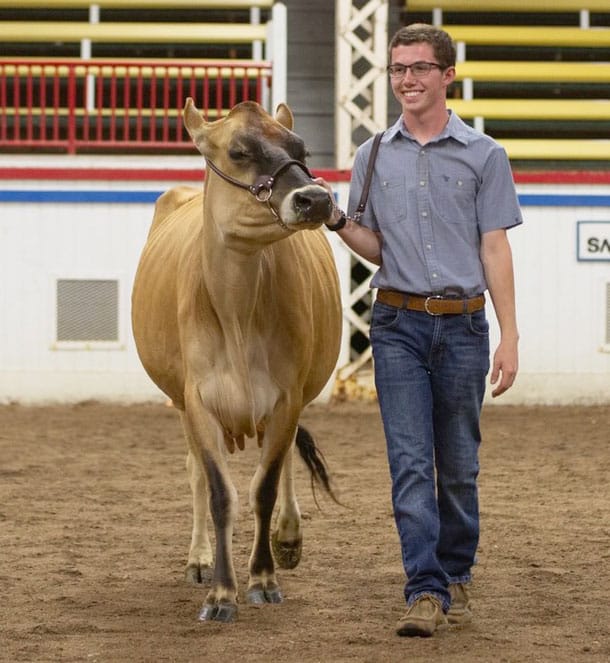
“I attended youth academy last summer and got a better view of what the association offers,” Cade noted. “I learned about genomics and got a deeper understanding of pedigrees.”
Genotyping was the first practice Cade implemented when he came home. Today, every Jersey female is genotyped as a baby calf. Cade also used what he learned about pedigrees and genetic evaluations to better evaluate bulls and choose sires for their mating program.
“We focus primarily on milk and fat yield along with Jersey Udder Index,” remarked Cade. “Dad also likes to look at Daughter Pregnancy Rate and I like to look at Jersey Performance Index.”
The Claycombs have embraced every chance to expand their understanding of the registered cattle business and get the most from their investment. This included having conversations with their area representative and AJCA staff members, who introduced Cade to Jersey Youth Academy and junior membership.
“The Jersey association has lots of resources,” said Cade. “We are still learning how to use everything because this is all new to us.”
The Road to Indianapolis
When he set out on his SAE journey as a member of the Trenton FFA Chapter, Cade did not aim for prizes and awards. His goal was to use contemporary technology to grow a profitable purebred herd for a pasture-based setup as quickly as possible. But as he neared the finish line, his advisors, Sadie Stimpson and Kabel Oaks, showed him the possibilities of going far beyond Trenton.
“When I saw everything coming together my junior year, it became very exciting,” Cade remarked.
But the young entrepreneur is quick to admit that none of it would have happened without his advisors, who pointed him in the right direction and helped him with the application process, and his parents, who made sure the work at home got done while he was in school.
Mrs. Stimpson and Mr. Oaks did the digging, found the opportunities, and said, “Let’s try this,” noted Cade.
At the chapter level, Cade was star greenhand his freshman year, star farmer his senior year, and served as secretary and vice president. He was a member of teams that competed at the state level in career development events for dairy cattle evaluation and management, agricultural sales, and forestry, among others.
In April, Cade was recognized as the Missouri State Star Farmer, an award given to the FFA member with the best production agriculture SAE in the state. He is on track to earn his American FFA Degree in 2025.
Cade’s route to the national agricultural proficiency award started with wins for his SAE dairy entrepreneurship project at the area and state levels. He was then eligible to compete in the national contest against winners from 30 different states. Cade and three others were announced as national finalists in August and interviewed virtually in September. They traveled to the National FFA Convention & Expo in Indianapolis, Ind., in late October, where Cade was announced on stage as the winner.
“I was so honored to have been selected as a national finalist that I could have left it there,” remarked Cade. “But winning the national award was a nice way to end that chapter of my life and sum up my work.”
Cade is now a junior at Oklahoma State University majoring in agricultural communications. He plans to earn a master’s degree in the same field, but his school of choice is undecided. In the long term, he would like to return to the home farm to diversify the operation. As the winner of the entrepreneurship award, he is well-equipped to do so.
